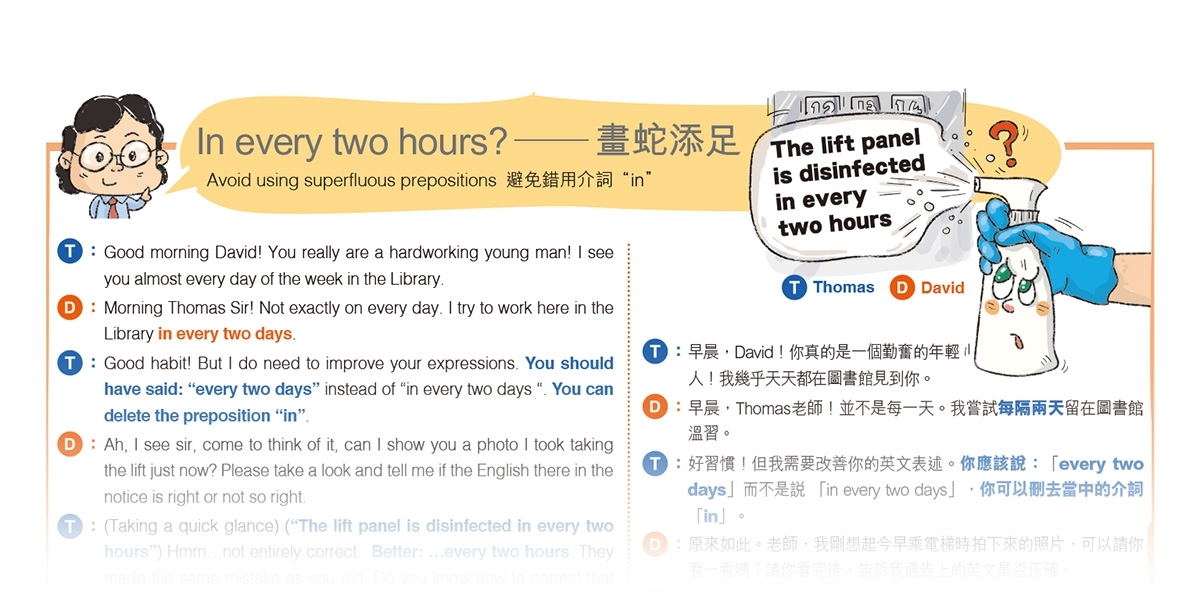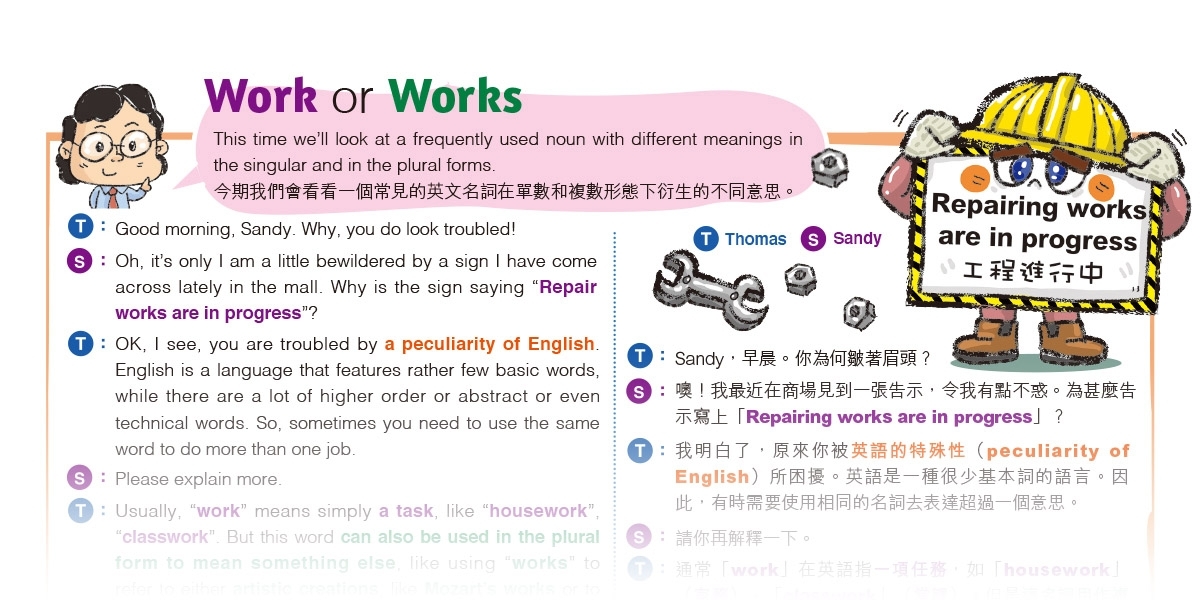昔日文章


Learning English with Thomas
2022.12.04
In every two hours? —— 畫蛇添足
Avoid using superfluous prepositions 避免錯用介詞“in”
T : Thomas D : David
T : Good morning David! You really are a hardworking young man! I see you almost every day of the week in the Library.
D : Morning Thomas Sir! Not exactly on every day. I try to work here in the Library in every two days.
T : Good habit! But I do need to improve your expressions. You should have said: “every two days” instead of “in every two days “. You can delete the preposition “in”.
D : Ah, I see sir, come to think of it, can I show you a photo I took taking the lift just now? Please take a look and tell me if the English there in the notice is right or not so right.
T : (Taking a quick glance) (“The lift panel is disinfected in every two hours”) Hmm…not entirely correct. Better: …every two hours. They made the same mistake as you did. Do you know how to correct that now?
D : Now I can, sir. It should be: “The lift panel is disinfected every two hours.” Is that right?
T : Haha! You certainly got it – learning fast and applying at once. (Teacher raising his thumb smilingly)
T : 早晨,David!你真的是一勤奮的年輕人!我幾乎天天都在圖書館見到你。
D : 早晨,Thomas老師!並不是每一天。我嘗試每隔兩天留在圖書館溫習。
T : 好習慣!但我需要改善你的英文表述。你應該說:「every two days」而不是說 「in every two days」,你可以刪去當中的介詞 「in」。
D : 原來如此。老師,我剛想起今早乘電梯時拍下來的照片,可以請你看一看嗎?請你看完後,告訴我通告上的英文是否正確。
T : (瞥了一眼)(「The lift panel is disinfected in every two hours」)嗯……這樣寫不完全正確,寫成「every two hours」較佳。 他們跟你一樣犯了相同的錯誤。你現在懂得如何修改嗎﹖
D : 老師,現在我懂了。這應該改為:「The lift panel is disinfected every two hours」,對嗎?
T : 哈哈,你果然是學以致用。(老師欣慰地豎起大姆指)


小學專題
2022.11.27
聖母小學
濃厚宗教氛圍 認識天主是愛
(本報專題)聖母小學的學生每個學期,都會按級別輪流到校內小聖堂朝拜聖體。學生跪下來,凝望祭台上的聖體,感受與基督的相遇。11 月煉靈月內,學生在朝拜聖體結束前,更一起誦唸「為煉靈祈禱文」,為煉獄中的靈魂祈禱。
聖母小學重視對學生的宗教培育,期望透過祈禱、禮儀生活及多元化的宗教活動,讓學生認識天主是愛,耶穌基督是救主的道理。「我們無法預料學生的未來,但在這六年的小學生涯中, 她們至少並不抗拒宗教,並對信仰很熟悉。」校長吳文健修女說。
由於小聖堂處於學校正門附近,吳修女提及學生每天上學回課室前,都會經過小聖堂,當中不少同學入內向耶穌像及聖母像微笑揮手,說: 「早晨耶穌!」、「聖母媽媽早晨!」
除了朝拜聖體,學校又舉行感恩祭、祈禱會、愛德服務;並透過宗教日及主題活動,向學生介紹耶穌、聖母、聖經人物的事蹟。吳修女表示,學生熟習祈禱,把擔憂與喜樂交託給天主。有時如果親友患病,學生更會主動向修女訴說, 再一起到小聖堂向天主祈禱, 「學生很珍惜與天主相處的時間。」
展開三年的準備期
為慶祝創校70周年,及預備母佑會來華百周年慶典,該校於2020年展開三年的準備期,每年設有不同的牧民主題,首年是「讚頌、感恩」;去年是「接受委託」;今年則以「福傳」為主題,期望學生以青年帶動青年的方式去傳播福音。
過去兩年,學校就牧民主題,開展不同活動。例如,為鼓勵學生實踐關愛,學校設立學生組織「關愛大使」,輔導同學的功課和溫習;而在學業上,又特設默書挑戰卡,邀請學生訂立默書目標,透過完成任務以獲得獎狀。
本學年學校為鼓勵學生福傳,特設「祈禱小夥伴」活動,鼓勵學生在小息時與同學結伴到小聖堂一起祈禱;在本年玫瑰月中, 學生同心協力,每天早上、小息在小聖堂或在家中誦唸聖母經,合共誦唸了10,000篇, 以祈禱表達對聖母的孝愛,教師李穎妍說: 「希望藉這些活動鼓勵學生勤唸聖母經,奉獻給聖母,從而培養祈禱的習慣。」
校訓「純潔仁愛」 認識生命的寶貴
聖母小學的校訓為「純潔仁愛」, 李老師指出,作為一所女校,學校近年也常邀請香港公教婚姻輔導會到校, 為高年級學生主持貞潔講座, 「希望在小學階段,讓他們珍惜,及懂得生命的寶貴,學懂去保護自己。」
為推廣生命的寶貴,聖母小學早前向香港公教婚姻輔導會借用聖珍安娜聖髑—— 衣服布料。聖髑安放在學校小聖堂的祭台上,全校學生敬禮並祈求聖人的轉禱。六年級學生葉爾晴被聖珍安娜為女兒犧牲生命的行為所感動,想起媽媽對自己的愛,所以特別求聖人為所有的母親轉禱,祈求她們皆能開心、健康地生活。
生命是天主賜予的禮物
學校為加深學生對聖珍安娜的認識,在課室播放有關聖人的片段;學生觀賞聖髑及介紹聖人的展板後,需要完成工作紙分享他們從聖人身上學習到的德行。
由於老師早已預告活動,六年級學生曾瑞琦早在上課前,已上網找尋聖人的資料,但她認為影片及展板加深她對聖人的認識。她表示,聖人的行為讓她感到母愛的偉大,「我們要更加珍惜生命,因為對媽媽來說,孩子都是天主賜予的禮物」。
學生鄧佩琳與鄧佩如姊妹倆,也感動於聖人為孩子犧牲生命的舉動。這份犧牲的精神使佩琳想到媽媽為了家人,而經常要通宵上班,並在回家後照顧家人,「我祈求聖人的轉禱,保佑媽媽健康」。
校長吳修女亦指出,是次活動配合天主教教育五大核心價值中的「生命」及「家庭」。她期望活動讓學生重新認識生命的寶貴,了解聖人的行實。(吳)


Learning English with Thomas
2022.11.20
“Makes your home comes true” —— correct or not?
「Makes your home comes true」—— 是對,還是錯﹖
Correct use of the verb “make” with infinitives 正確使用英文動詞“Make”的不定式(infinitives)
T : Thomas t : Tony
T : Tony, morning! How are you doing lately?
t : Could be better.
T : You do sound troubled.
t : It’s only this crazy grammar making me fail in drill exercises all the time, especially using infinitives together with verbs like make, let, help, and so on. Can I show you a picture? Is the language there in this ad correct?
T : Ah, it reads “(something) Makes your home comes true”. It’s wrong grammatically, because when you use the verb make, like in this case, the other verb that comes after it must be an infinitive without “ to” and cannot be another main verb.
t : How should it be corrected?
T : It should be “(whatever that may be that) makes your home come true”. For one thing, there can only be one main verb in a sentence, so the other verb-like items must be either infinitives or participles.
t : Very clear now. Thanks so much!
T : 早晨,Tony!你近來好嗎?
t : 可以更好。
T : 聽起來你好像有煩惱。
t : 這些英文文法令我經常在作業練習中犯錯,尤其是使用動詞的不定式,如make、let、help等等。我想你幫我看看這圖片,相中的廣告的用語使用正確嗎?
T : 啊,上面寫著 「(某事)Makes your home comes true」。在語法上而言,這表達是錯誤的。因為當你使用動詞make時,它後面的另一個動詞必定是不定式,不能使用「to」,並且它不能充當另一個主要動詞。
t : 應該怎樣改寫﹖
T : 正確寫法應該是「makes your home come true」。 有一點必須謹記,英文句子中只能有一個主要動詞,因此在同一句子中貌似動詞的詞彙,必須以不定式(infinitives)或分詞(participles)形式出現。
t : 我現在很清楚了。感謝你的指導!


Learning English with Thomas
2022.09.25
Work or Works
This time we’ll look at a frequently used noun with different meanings in the singular and in the plural forms.
今期我們會看看一個常見的英文名詞在單數和複數形態下衍生的不同意思。
T: Thomas, S: Sandy
T: Good morning, Sandy. Why, you do look troubled!
S: Oh, it’s only I am a little bewildered by a sign I have come across lately in the mall. Why is the sign saying “Repair works are in progress”?
T: OK, I see, you are troubled by a peculiarity of English. English is a language that features rather few basic words, while there are a lot of higher order or abstract or even technical words. So, sometimes you need to use the same word to do more than one job.
S: Please explain more.
T: Usually, “work” means simply a task, like “housework”, “classwork”. But this word can also be used in the plural form to mean something else, like using “works” to refer to either artistic creations, like Mozart’s works or to construction tasks. One more use of “works” is to refer to an industrial plant, such as motorcar works, meaning factory. For this usage “works” is always used in the plural form.
S: It’s clear now. Thank you, sir!
T: Sandy,早晨。你為何皺著眉頭?
S: 噢 !我最近在商場見到一張告示,令我有點不惑。為甚麼告示寫上「Repairing works are in progress」?
T: 我明白了,原來你被英語的特殊性(peculiarity of English)所困擾。英語是一種很少基本詞的語言。因此,有時需要使用相同的名詞去表達超過一個意思。
S: 請你再解釋一下。
T: 通常「work」在英語指一項任務,如「housework」(家務)、「classwork」(堂課)。但是這名詞用作複數時有另一含義,如「works」解作藝術創作,好似莫扎特嘅作品。又可以指建築工程;或者工廠,例如汽車廠。就此涵義,「works」多數以複數形態出現。
S: 現在我清楚了。多謝老師 !


